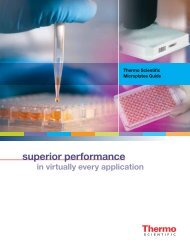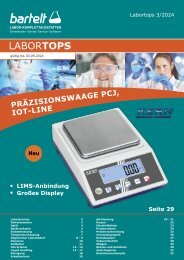PeloBiotech
You also want an ePaper? Increase the reach of your titles
YUMPU automatically turns print PDFs into web optimized ePapers that Google loves.
www.pelobiotech.com<br />
Antibodies<br />
Antibodies are glycoproteins produced by plasma cells in response to foreign antigens that illicit an innate immune response.<br />
Due to recombination of the genes the variety of antibody responses is vast but highly specific, monoclonal antibodies are<br />
produced by clonally expanded by lymphocytes against a specific antigen and these have similar antigen binding site region<br />
binding affinity for their targets and identical downstream effects. These antibodies are often used in biochemical analysis,<br />
radioimmunotherapy, detection of various viruses and diseases. We offer various antibodies for detection of immune cells,<br />
proteins, epigenetic modifications, viruses, stemness and diseases.<br />
Amyloidosis is one such disease which is difficult to diagnose due to the heterogeneity of the amyloid proteins. The gold<br />
standard for amyloidosis diagnosis is tissue biopsy followed by Congo red staining and confirmation through characteristic<br />
apple-green birefringence under polarized light microscopy. However, biopsies may not always be feasible or accessible,<br />
and sampling errors can occur due to the focal nature of amyloid deposition. Additionally, immunohistochemistry,<br />
immunofluorescence, and electron microscopy can aid in subtype identification.<br />
However, these techniques have limitations in detecting small or oligomeric forms of amyloid fibrils. Currently amYmed is<br />
the only company that offers antibodies designed for detecting amyloidosis. The immunohistochemical classification of<br />
amyloid using the amY-kit antibodies is a key offering from amYmed. Their antibody panel consists of 10 tubes with 16<br />
antibodies, covering 98% of the most common amyloidosis. The accuracy of their classification method has been validated<br />
through extensive studies, blind comparative analyses, and collaborations with other institutes.<br />
Comparisons with mass spectrometry have further confirmed the reliability and quality of their approach. The advantages<br />
of immunohistochemical classification include its precision, simplicity, speed, and affordability. By utilizing this technique,<br />
healthcare professionals can quickly identify the correct amyloid type, even in the early stages of the disease, allowing for<br />
timely intervention and management.<br />
If you would like to know more about Amyloidosis then please take a look at our article on our website here.<br />
You can also check out articles by a leading researcher in the field of amyloidosis here.<br />
63
















